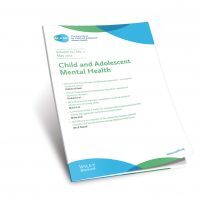Cohort study
-

The effects of COVID-19 on child mental health: Biannual assessments up to April 2022 in a clinical and two general population samples
Open Access paper from JCPP Advances – ‘We examined how child mental health has developed since the start of the COVID-19 pandemic up to 2 years into the pandemic (April 2022). We included children (age 8–18) from two general population samples and one clinical sample receiving psychiatric care.’ Josjan Zijlmans (pic) et al.
Read more -

Methodological Review: Twins Early Development Study (TEDS): A genetically sensitive investigation of mental health outcomes in the mid-twenties
Open Access paper from JCPP Advances – ‘This paper outlines recent data collection efforts supporting this work, including a cohort-wide mental health assessment at age 26 and a multi-phase Covid-19 study.’ Celestine Lockhart et al.
Read more -

Infant sleep predicts trajectories of social attention and later autism traits
Open Access paper from the JCPP – ‘We used a prospective longitudinal design in infants with a family history of ASD and/or ADHD to examine infant sleep and its relation to trajectories of attention and later neurodevelopmental disorders.’ Jannath Begum-Ali et al.
Read more -

Melatonin use and the risk of self-harm and unintentional injuries in youths with and without psychiatric disorders
Open Access paper from the JCPP – ‘This study investigated whether melatonin, which is the most common medication for sleep disturbances in youth in Sweden, is associated with a decreased risk of injury. Analyses were stratified by sex, injury type, psychiatric comorbidities and age at melatonin-treatment initiation’. Marica Leone (pic) et al.
Read more -

Examining Children and adolescent mental health trajectories during the COVID-19 pandemic: Findings from a year of the Co-SPACE study
Open Access paper from JCPP Advances – ‘In this study we mapped children and adolescents’ mental health trajectories over 13 months of the pandemic and examine whether family, peer, and individual-level factors were associated with trajectory membership.’ Carolina Guzman Holst (pic) et al.
Read more -

Mortality risk following self-harm in young people: a population cohort study using the Northern Ireland Registry of Self-Harm
Open Access paper from the JCPP – ‘The aims of this study were to describe the characteristics of young people who present with self-harm; quantify the risk of suicide and other causes of death during follow up, and to identify factors associated with mortality risk’. Emma Ross (pic) et al.
Read more -

Genome-wide DNA methylation analysis of aggressive behaviour: a longitudinal population-based study
Open Access paper from the JCPP – ‘We examined the association between aggressive behaviour, as measured by Life History of Aggression (LHA) total score and DNAm levels both assessed at age 25.’ Ehsan Pishva (pic) et al.
Read more -

Commentary: Modeling the malleable mental health trajectory – a commentary on Oldehinkel and Ormel (2023)
Open Access paper from the JCPP – ‘In their Annual Research Review, Oldehinkel & Ormel argue that psychological and psychiatric researchers should not only compare groups but also focus on the within-person variability using repeated measurements in longitudinal studies to advance our understanding of emotional and behavioral problems. I argue adopting such within-person approaches might also change how we think about causality and might lead us to more successful intervention research.’ Henning Tiemeier
Read more -

Childhood mental health difficulties mediate the long-term association between early-life adversity at age 3 and poorer cognitive functioning at ages 11 and 14
Open Access paper from the JCPP – ‘Here, we test the hypothesis that early-life adversity may lead to mental health challenges which in turn have adverse consequences for the development of cognitive abilities.’ Tochukwu Nweze (pic) et al.
Read more -

Age-related differences in social media use, online social support, and depressive symptoms in adolescents and emerging adults
Paper from the CAMH journal – ‘Using a cross-sectional sample of participants aged 14–22 years, we examined (a) linear and non-linear age-related changes in social media use and online social support and (b) age-related differences in the effects of social media use and online social support on depressive symptoms.’ Madison Politte-Corn et al.
Read more